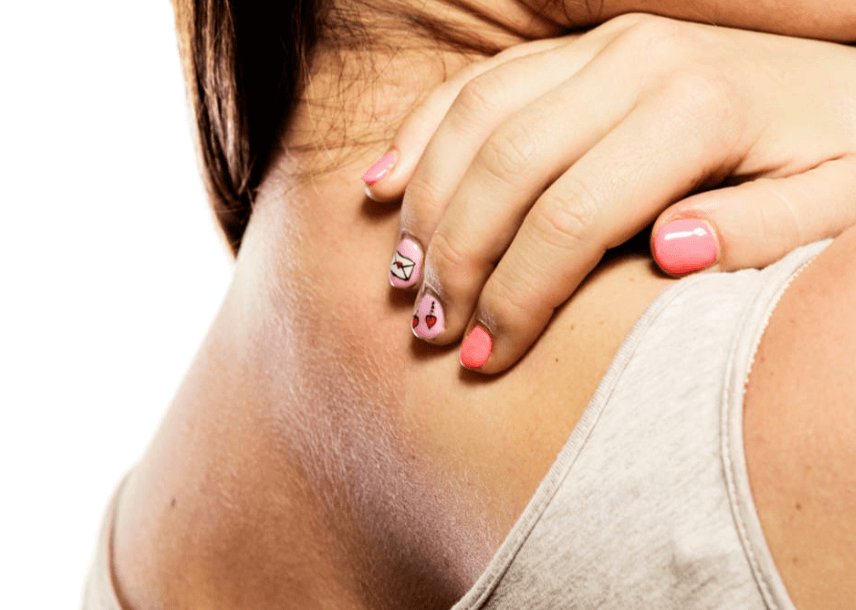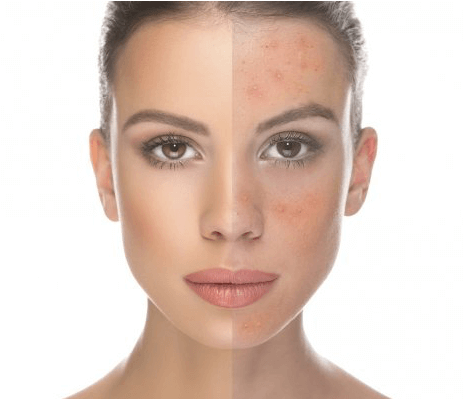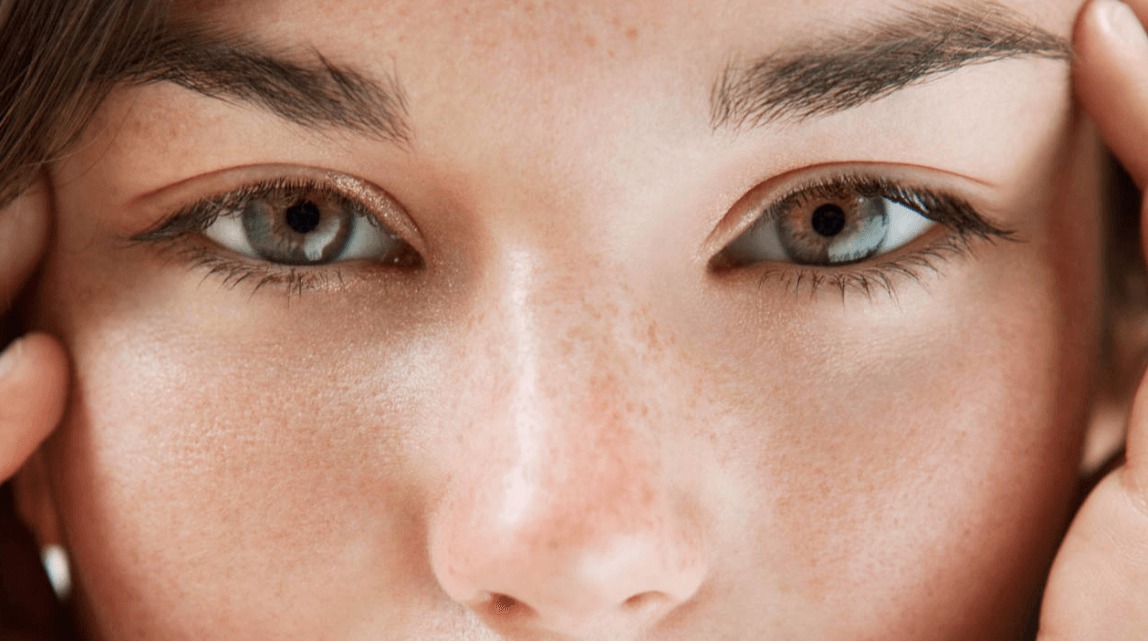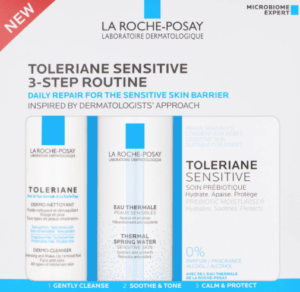Sensitive skin can be genetic. It can also become weakened by extrinsic factors like the sun, pollution, or extreme heat and cold. Other, intrinsic factors may make the skin more reactive too – hormones, age, and stress are all factors that can contribute as does your diet.
Help For Sensitive Skin

With regard to sensitive skin, it’s a true and accurate saying, “you are what you eat.” But, for most people, diet is something that seems to get disregarded as a contributor to skin health and how it reacts to certain foods. Here are our top skin nutrition tips, focusing on the best foods for healthy skin and those you should be avoiding. If you are seeking help for sensitive skin – your diet can make a difference!
Treating skin too aggressively is one of the chief reason why skin reacts. “Even if you do not intend to, you could be overwhelming your skin. The average woman uses 12 different products with 168 unique ingredients every day” according to the Environmental Working Group in Washington, D.C.
What Is Sensitive Skin?
The best way to define sensitive skin is skin that is hyper-reactive to its environment. It will often become red, flaky, spotty and inflamed and feeling itchy, hot and uncomfortable when triggered. The reaction is because, for one reason or another, the barrier function of the skin has become compromised.
There are several reasons why this can happen, and why it is so difficult to find what is the cause of your skin to have an adverse reaction. Sensitive skin can be genetic. It can also become weakened by extrinsic factors like the sun, pollution, or extreme heat and cold. Other, intrinsic factors may make the skin more reactive too – hormones, age, and stress are all factors that can contribute as does your diet.
If the skin on your face feels tight and has a coarse texture feel, it could be dry or naturally dehydrated. Dehydrated skin is precisely what it says: a complexion lacking in water, and moisture.
It could be a result of your diet, the weather, or the products you’re using. (Too much alcohol in a product is a common culprit) But dehydrated skin is a temporary condition, whereas dry skin is a skin type – the one you’re born with and have to deal with your entire life. Dry skin doesn’t produce enough oil, so it’s always in need of a dose of moisture. And when dryness peaks, skin cells can start to lift, causing irritation and itchiness.
Read – Alcohol and Skincare Products – The Facts
Your Diet Can Make A Difference

The skin is the largest organ in the body; the condition of it is a useful guide to a person’s well-being. So, if you have a diet of junk food, processed meals, and sugary snacks, there is every chance this will eventually play havoc with your general health.
So, this type of diet will gradually affect how the skin is going to look and feel. A good beauty regime needs to take into account two things. What we put into the body, and what we apply onto the body.
Read – Mediterranean Diet For Health Benefits
Are Certain Foods Likely To Intensify Skin Irritation?
Research into how certain foods can impact skin health is still limited. But there is ever-increasing evidence that certain foods are more actively associated with sensitive skin and skin damage. Research implies that a diet high in processed or refined carbohydrates and unhealthy fats can lead to premature skin aging.
Even though you’re well beyond puberty, pimples keep popping up the same way they did before you finished school.
Acne occurs for any number of reasons; it could be because of stress, or a lack of sleep. Overactive oil glands will cause pimples to appear or exposure to comedogenic products that tend to cause blackheads by blocking the pores of the skin. But, sensitive skin types are particularly susceptible because they’re naturally prone to inflammation.
Foods To Be Weary Of:
Foods With Additives – Such as food coloring, can trigger inflammation.
Salt – As hydration is such an essential part of maintaining healthy skin, salt, which dehydrates the body, should be reduced.
You can counterbalance eating salty foods by drinking plenty of water.
Sugar – A diet high in sugar brings on inflammation. Sugar binds to collagen through a process called glycation, and this leads to the skin getting stiff. Ultimately, this will lead to premature aging, rosacea, sensitive skin, and acne.
Junk Food – processed fast food tend to have high levels of salt and sugar as well as additives. Avoid not just for the sake of your skin, but your general health also!
Spicy Food – Spicy, hot foods are stimulants; this can increase circulation and raise the bodies’ temperature. The extra heat in the skin may cause it to become aggravated and more sensitive.
Is Skin Sensitivity Due To A Food Allergy?
In some cases, a food additive or a particular food may cause the skin to become sensitive and reactive. Particularly skin that is delicate and vulnerable and this could be a sign that the body is allergic to a particular food. Foods that are known to cause a reaction or ‘trigger’ foods include dairy, gluten, soy, peanuts, and eggs but keep in mind that the problem could lie with other foods too. It is advisable to have an allergy test to find out which foods might be the ‘triggers’ for your sensitive skin.
See Product on – lookfantastic.com
Skin Nutrition – A Healthy Diet For A Glowing Complexion
There are many advantages to choosing a healthy eating plan. Generally, foods that are good for the skin are also the best foods for your overall well-being.
Cutting out processed foods, bad fats, sugar, caffeine and alcohol and increasing fresh fruit, vegetables, and omega 3’s. By doing, this, you will get the added bonus of boosting energy levels, brainpower, healthy hair, and gain control of any weight problems.
Video – Ultra-Sensitive skin
The Best Foods For Skin Health
A varied diet that incorporates plenty of fruit, vegetables, whole grains, nuts, seeds, beans, and omega-three fatty acids is key to keeping your skin hydrated. It will also give the skin all the vitamins and minerals it needs to perform. Research has shown that antioxidant-rich foods have a protective effect on the skin.
Foods that contain the following properties are said to be good for the skin:
Omega 3 fatty acids – these are to be found in oily fish, walnuts and flaxseed oil, and help to replenish the skins natural barrier.
Selenium – this helps protect skin from free-radicals and found foods like Brazil nuts, prawns, lamb, fish beef, turkey, oysters, crab, sardines, and whole-wheat pasta.
Antioxidants – are important for slowing and preventing free-radical damage and maintaining healthy cells. You find these in many different foods, especially colorful fruits and vegetables like berries, beetroot, squash, peppers, tomatoes, and spinach.
Coenzyme Q10 – this essential antioxidant that is required for energy and for cells to work. The body makes it, but as the body ages, CoQ10 depletes. You will find the antioxidant in salmon and tuna, liver, poultry, and whole grains.
Vitamin A – can be found in foods such as leafy green vegetables, carrots, dairy foods, oranges, and melons. It is a vital requirement to help repair the skin.
Vitamin C – helps to protect the skin from sun damage and repair cells. You will find it in citrus fruits, kiwis, papayas, broccoli, and bell peppers.
Vitamin E – said to be one of the most useful vitamins for people with sensitive skin. Vital for relieving skin from sun damage and reducing inflammation. Available from vegetable oils, greens, nuts, seeds, and asparagus.
Vitamin B – is believed to support the skin, hair, and muscle tone; you will find this in dark leafy vegetables, lentils, nuts, seeds, and brown rice.
The Importance Of Fluids

Sensitive skin can be down to the skin being dehydrated. When the skin’s protective layer, or stratum corneum, lacks moisture, it is unable to function correctly. The Stratum Corneum is made up of cells and lipids that, when healthy, form a porous barrier that keeps the skin moist, while also blocking out toxins and free radicals.
If you do not consume enough fluids, then this top layer of the skin is compromised, leading to premature signs of aging. Keeping the body hydrated is a critical part of having healthy skin.
Drinking enough fluids also acts as a ‘flushing system’ in the body to help remove toxins; if these are allowed to build up, it can cause skin sensitivity. Adults need to drink at least eight glasses of pure, filtered water daily to help the body detoxify.
Remember, not all fluids are helpful to your skin; in fact, some can actively increase sensitivity levels.
Fluids To Avoid
Alcohol – Acts as a diuretic that robs the body of fluids and dehydrates the skin.
Caffeine – This is also a diuretic that sucks out moisture from the skin.
Sugary Sodas – They come crammed with refined sugar and chemicals.
When Will I See Improvement?

While some changes, such as increasing your water intake, may have an immediate positive effect on the look and feel of skin. However, most dietary changes will take a few weeks to have a positive impact. Changes to the skin take up to six weeks to renew, so the visible effects from changes in your diet will emerge over time.
For persistent skin conditions, it is advised to talk to your GP or make an appointment to see a dermatologist.
I do hope you have found this post on ‘Help For Sensitive Skin – Your Diet Can Make A Difference!’ to be helpful. If you have any questions please leave them in the comment box below and I will be happy to discuss them with you.



This is so true, my diet makes such a difference to my skin. If I ever decide to indulge in a ‘naughty’ takeaway from a particular food chain (mentioning no names, but they are big!) my skin lets me know. It almost feels that within minutes I have a nasty ‘breakout’ appearing! I now try and keep what I eat in check and my skin appreciates it 🙂
I have ‘overly’ sensitive skin, not only do I have to be careful with my food, but also with what I use to wash my clothes with and the cosmetics I use. It’s very tiring when you have to constantly be aware of everything to do with your overall well-being! Thanks for the advice you give here.
Hi Sondra, I sympathise with you, having very sensitive skin is extremely challenging. A friend of mine gets an allergic reaction on her skin to certain detergents but it took her a long time and a lot of experimenting to find first what was causing the problem and then to find a detergent she could use that would not bring out a bad reaction. I hope you have been able to find answers to your reactions and hopefully with time they may improve of clear up completely.
I have found my skin gets so sensitive and dry over winter months, and since reading your advice about drinking more water and adding a good moisturizer to my routine morning and night (which I must say I didn’t always manage to do!) I have seen a big improvement in the condition and dryness. For some reason I always find enough drinking water to be very difficult, especially when the weather is cold, it seems very unappealing, but as I have now increased my intake I have become to realise just how important it is for my skin condition.